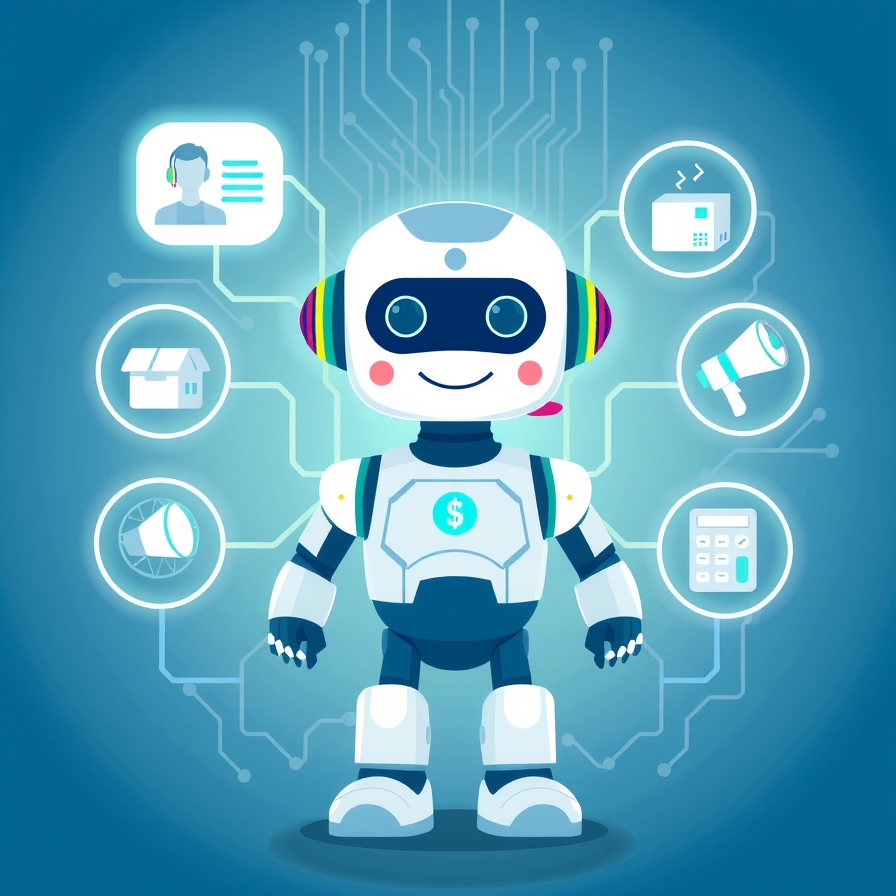AI Tools for Small Business Automation: A Complete Guide for 2025
In today’s fast-evolving digital landscape, small businesses are increasingly turning to Artificial Intelligence (AI) to automate routine tasks, improve efficiency, and compete with larger enterprises. AI tools are no longer exclusive to big corporations; affordable and user-friendly AI solutions are empowering small businesses to streamline operations, enhance customer experience, and boost sales. This article explores how small businesses can leverage AI tools for automation, the benefits they offer, and the best AI solutions available in 2025.
What is AI in Small Business Automation?
Artificial Intelligence refers to computer systems designed to perform tasks that normally require human intelligence. These tasks include learning, reasoning, problem-solving, and language understanding. In small business automation, AI software can handle repetitive and data-heavy tasks such as customer support, inventory management, marketing, and financial analysis without constant human intervention.
AI technologies used in small businesses include:
-
Machine Learning (ML): Systems that learn from data to improve performance over time.
-
Natural Language Processing (NLP): Enables machines to understand and respond to human language.
-
Computer Vision: Allows AI to interpret images and videos.
-
Robotic Process Automation (RPA): Automates rule-based, repetitive tasks.
By integrating these technologies, small businesses can save time, reduce errors, and focus on strategic growth.
Why Small Businesses Should Adopt AI Automation
1. Boost Efficiency and Productivity
AI tools automate time-consuming tasks like answering customer queries, managing inventory, generating reports, and scheduling social media posts. This automation frees up employees to focus on creative and high-value activities.
2. Cost Savings
Automation reduces the need for additional hires or overtime work. It also minimizes human errors that can lead to financial losses. Many AI tools offer affordable subscription plans or free tiers, making them accessible to small businesses with limited budgets.
3. Enhanced Customer Experience
AI-powered chatbots provide 24/7 customer support, answering common questions instantly and guiding customers through purchases. Personalized marketing powered by AI improves customer engagement and loyalty.
4. Data-Driven Decision Making
AI analyzes vast amounts of business data to generate insights and forecasts. Small businesses can use predictive analytics to anticipate demand, optimize inventory, and tailor marketing strategies.
Key Areas Where AI Can Automate Small Business Tasks
Customer Service Automation
AI chatbots like Ada and Forethought can handle routine customer inquiries such as order status, product recommendations, and return processing. This reduces wait times and improves customer satisfaction.
Marketing and Content Creation
AI tools can generate product descriptions, social media posts, email campaigns, and SEO-friendly content quickly. Platforms like Jasper and Copy.ai help small businesses maintain consistent and engaging marketing efforts without hiring large teams.
Inventory and Supply Chain Management
AI-powered inventory tools monitor stock levels, predict demand, and automate reordering. This prevents stockouts and excess inventory, optimizing working capital.
Sales and Lead Generation
AI systems analyze customer data to identify high-potential leads and personalize sales outreach. Tools like HubSpot’s AI features automate follow-ups and improve conversion rates.
Financial Management
AI automates bookkeeping tasks such as expense categorization, invoicing, and fraud detection. Software like QuickBooks integrates AI to streamline accounting processes.
Top AI Tools for Small Business Automation in 2025
| Tool Name | Primary Use Case | Key Features | Pricing Model |
|---|---|---|---|
| Ada | Customer Service Chatbot | 24/7 automated support, multilingual | Subscription-based |
| Jasper AI | Content Creation | AI writing assistant for blogs, ads | Tiered subscription |
| Stock Perfect | Inventory Management | Automated stock monitoring, reorder alerts | Subscription-based |
| HubSpot AI | Sales & Marketing Automation | Lead scoring, email automation | Freemium + paid plans |
| QuickBooks AI | Financial Automation | Automated bookkeeping, fraud detection | Subscription-based |
| Dataiku | Predictive Analytics | Demand forecasting, data visualization | Custom pricing |
| Zapier | Workflow Automation | Connects apps, automates repetitive tasks | Freemium + paid plans |
These tools are designed to be user-friendly, requiring little to no coding skills, making them ideal for small business owners and teams.
How to Implement AI Automation in Your Small Business
Step 1: Identify Repetitive Tasks
Start by listing tasks that consume significant time but require minimal creativity, such as customer queries, data entry, or social media posting.
Step 2: Choose the Right AI Tools
Select AI solutions that directly address your business needs. Consider factors like ease of use, integration capabilities, pricing, and customer support.
Step 3: Train Your Team
Ensure your staff understands how to use AI tools effectively. Many platforms offer tutorials and customer service to help with onboarding.
Step 4: Monitor and Optimize
Regularly review AI performance metrics and gather feedback. Adjust settings or switch tools if necessary to maximize benefits.
Challenges and Considerations
-
Data Privacy: Ensure AI tools comply with data protection regulations like GDPR.
-
Initial Setup: Some AI solutions may require upfront time investment for configuration.
-
Human Oversight: AI should augment human work, not completely replace it, especially in complex decision-making.
-
Cost vs. Benefit: Evaluate ROI carefully, especially for very small businesses.
Future Trends in AI for Small Business Automation
-
Generative AI: Creating personalized marketing content and product designs.
-
Voice-Activated Assistants: More natural customer interactions.
-
AI-Driven Cybersecurity: Protecting small businesses from increasing cyber threats.
-
Integration with IoT: Smarter inventory and supply chain management.
Conclusion
AI tools for small business automation are transforming how entrepreneurs operate, compete, and grow. By automating routine tasks, small businesses can increase productivity, reduce costs, and deliver better customer experiences. The key is to start small, choose the right tools, and continuously optimize your AI strategy. Embracing AI today will prepare your business for the competitive landscape of tomorrow.

